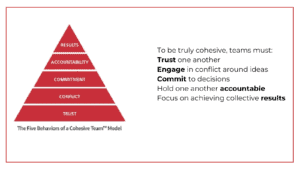We all think we are good team members who contribute and have a positive impact on the outcome of teamwork. But are we?
The reality is we don’t spend much time talking to each other on how we can become even better team members, and therefore make our team stronger. Surveys (Wiley and Sons) have shown that holding one another accountable, by providing feedback, is one of the more difficult things to do.
Ultimately there are five behaviors that form the framework of a cohesive team, and learning about how these behaviors are interconnected creates a personalized program called The Five Behaviors™.
Trust
The foundational behaviour of a cohesive team is trust, and that means a willingness to be vulnerable with one another. Vulnerability based trust can only exist when we are confident our peer’s intentions are good and that there is no reason to be protective or careful around the team. Without trust, team members conceal mistakes, fail to seek out help, and may assume the worst around their team members intentions or abilities.
Building trust can be challenging, for everyone. It is often difficult to let down one’s guard. It is ideal to understand, given our particular workplace personality, some of the behaviors we may be afraid of, such as fear of disapproval, anticipating negativity, or having ideas discounted.
Building trust is a process and requires developed habits that we consciously practice. We need to be willing to have conversations and ask questions that allow us to better understand one another, and willingly apologize when we make mistakes, and open up to share our feelings when we have concerns.
Conflict
We often perceive conflict as negative; surveys (Wiley and Sons) have shown 90% do associate conflict as such. If we associate conflict with simply an uncomfortable conversation, we may be more willing to engage in conflict, and embrace an emotional or passionate debate. Without these debates, team decisions do not get made and team members avoid offering opinions. That can create resentment, and avoidance.
When conflict is productive, versus destructive and mean-spirited, team members are not afraid to voice and seek out opinions, confront one another on important issues (even if difficult), and work together to uncover the best solutions.
Understanding our natural tendencies to conflict (i.e., calm versus spirited or receptive versus steadfast) will increase our self awareness and encourage us to consider other inclinations. Like any behaviour, developing the habits necessary to focus on opportunity areas will offer great benefits.
Commitment
People will not actively commit to a decision if they have not had the opportunity to contribute an opinion, ask questions, and understand decision making rationale. When everyone contributes, the entire team benefits from one another’s opinions and contributions. This allows an opportunity to ask questions for even further understanding, or debate.
To work effectively together, a team must be clear on their overall direction and priorities. A team does not have to reach consensus, as this will stall decision making, but they do need to commit to calls to action that support the final decision. Clarity plays in important role in achieving commitment, and ensures the entire team is on the same page.
Buy in can be more difficult if one does not feel enthusiastic about a decision, and continuing to ask questions to gain a thorough understanding can be helpful. If team spirit is strong, this can encourage the optimism needed to embrace a decision and support the team. If we remain positive and enthusiastic, we can trust the outcome.
Accountability
We usually do not like to hold others accountable unless they ask us to or there is a clear commitment in place. We should, however, agree as a team that we will hold one another accountable so everyone contributes to the commitment they made within the time frame agreed upon. Accountability is simply the willingness of team members to call on their teammates on performance or behaviors that might hold back the team.
It can be challenging to do if we anticipate confrontation or conflict. It can become easier if we practice and realize if everyone is held accountable, the team performance increases and that can be rewarding. An accountability conversation should be timely, and private in the appropriate setting. Asking for permission to offer feedback can open the door to starting a challenging conversation and may feel less direct.
Learning to accept feedback is equally important, and learning to say thank you instead of becoming defensive is an ideal reaction. Appreciating the feedback can lead to asking for help or support, and ultimately learning how to become a better team contributor.
Results
Results is the last critical behavior to achieving collective goals. Working cohesively with the team facilitates this success and leads to performance-based outcomes. A team that embraces results values collective success more than individual achievement and is willing to make sacrifices for the good of the team. When the team fails to achieve collective results, one should take personal responsibility to improve the team’s performance.
Knowing and understanding your motivators and stressors, as they relate to achieving team results is important and can avoid some of the roadblocks we face if we do not feel motivated or feel drained by certain tasks.
On cohesive teams, all members, no matter what their individual responsibilities and areas of expertise, do whatever they can to help the team accomplish its goals. Developing the habits that work best for an individual can help one do their part and encourage a focus on team results.
Click here to learn more about The Five Behaviors!
What is The Five Behaviors® Personal Development?
The Five Behaviors® Personal Development is the result of a partnership between Wiley and best-selling author Patrick Lencioni. The solution teaches individuals to become better teammates by integrating the model from Lencioni’s book, The Five Dysfunctions of a Team, at the organizational level.
This powerful experience assesses an individual’s approach to teamwork, provides personalized insights on how they can more effectively work with others, and teaches participants the critical behaviors and interpersonal skills needed to work together successfully.
The result is a unique and impactful team development solution that empowers individuals to rethink their approach to teamwork, shape new, more productive behaviors to increase productivity, and create a common language that completely redefines what it means to work together to build a culture of teamwork.
X5 Management is an award-winning Authorized Partner for The Five Behaviors™ programs.
References
Lencioni, Patrick (2016) The Five Dysfunctions of a TEAM, Jossey-Bass, A Wiley Imprint
Wiley, John & Sons, Inc. (2019) The Five Behaviors of a Cohesive Team®





